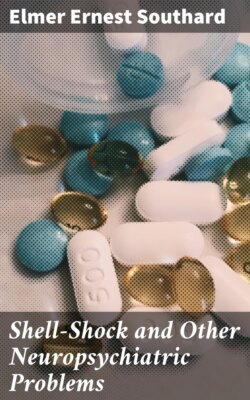Читать книгу Shell-Shock and Other Neuropsychiatric Problems - Elmer Ernest Southard - Страница 96
На сайте Литреса книга снята с продажи.
ОглавлениеDesertion, drunk. Contributory factors.
Case 90. (Kastan, January, 1916.)
Gottlieb S. left the barracks, January 25, 1915, met friends and drank with them, remaining all night in the railway restaurant and waiting room. He was promptly arrested.
According to the patient, he had always drunk a good deal and had once fallen from his horse in the campaign, and become unconscious. After this fall, he said he had been able to stand less alcohol than before.
There is doubt as to the syphilis of Gottlieb. He said he had been infected once, but his further statement that he had six relapses is, of course, questionable. As to the hypothesis of feeblemindedness, it appears that in childhood he had learned badly and had been a stammerer. He had been a herdsman, and after that a laborer. He finally became a travelling man for a specialty photographer.
He had previously been convicted of an embezzlement, brawling, and breach of the peace.
As to his military crime, he said he had been celebrating the emperor’s birthday the last three days, being urged on by acquaintances and drinking whiskey. He was, in fact, on a spree and did not eat properly. He had met a student in the railway station and had forgotten all about his military service. He remembered having spoken with the waiter, remembered telling the student that he was going to commit suicide, and the student had drunk seltzer with him. January 29, he for some reason drank no more, and then it occurred to him that he ought to go back to duty. He remembered that he was easily led astray. He had once thought of becoming a tanner but had been dissuaded from the trade because of its bad smell.
The analysis of this case must consider, first, syphilis. Supposing, however, that this hypothesis is not substantiated by laboratory findings, the hypothesis of feeblemindedness might well be raised. It seems possible, if not probable, that this patient was in the subnormal group, lying between normality and feeble-mindedness proper. The value of mental tests would here be extreme. There seems to be no evident epilepsy, and the majority of the phenomena can perhaps best be explained by alcoholism. Possibly the case is one of so-called pathological intoxication. The patient’s own story that, although he had been always subject to drink, he had been less tolerant of alcohol since a fall from his horse, seems to be entirely consistent with the post-traumatic history of numerous cases, so that it would hardly be wise to consider that alcohol accounts for the whole story. We must raise then in succession the hypothesis of syphilis, feeblemindedness, alcoholism, and coarse brain disease, bearing in mind also early stammering. As to the utilization of such a man, it would appear that a supervision of him with absolute countermanding of alcohol in view of the decrease in tolerance of alcohol since the fall from his horse might perhaps preserve this man for some form of military service.
Re German and French war alcoholism, Soukhanoff remarks that the conditions in these countries were in strong contrast to those in Russia. In Russia there was a great decrease in the number of cases of acute alcoholic psychosis; particularly at the time of mobilization, there were few cases of alcoholic psychosis. He says that during the Russo-Japanese war, alcoholic psychoses constituted a third of all the mental cases observed. This figure corresponds with that quoted above from Lépine (see under Case 86). Soukhanoff, writing in 1915, had not observed personally a single case of alcoholic psychosis. Incidentally, the number of cases of psychosis in the Russian army had remained in general small.
